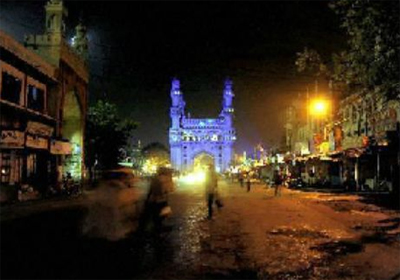
Despite curfew in some areas, minor communal incidents, including a bid to burn down a garage at Umda Bazaar in Kamatipura, have been reported from different areas of the walled city on Monday.
Elsewhere, miscreants dumped body parts of animals at two places of worship.
Apart from curfew-bound areas of Madannapet and Saidabad , shops and business establishments remained shut throughout the Old City. Meanwhile, police have arrested seven persons for their role in Sunday's communal incidents and 25 cases of violence have been transferred to the Central Crime Station (CCS) on Monday.
Following the incident of miscreants throwing objectionable material at a place of worship in Narayanguda on Sunday night, two more such incidents have been reported in Kacheguda on Monday morning. Bang in front of a religious place on the Amberpet-Kacheguda road, miscreants threw animal parts in the wee hours of Monday. Alerted by its staff, police immediately reached the spot and removed the animal parts.
Later, representatives of another place of worship in Nimboliadda approached police alleging that they found flesh on their premises. "We have booked suo motu cases under sections 295-A (Maliciously insulting the religious sentiments of any religion) and 153-A (promoting enmity between classes) of the Indian Penal Code (IPC)," DCP, East Zone, Y Gangadhar said.
On Sunday night, East and South zone police rounded up 157 communal and history sheeters. The South Zone police have registered 15 cases in relation to the communal violence, while the East Zone booked 12 cases. The Chandrayangutta police have arrested Shaik Jaffar and Shaik Shareef for damaging an RTC bus, while the Saidabad police arrested five persons __ Syed Javeed, Imran Bin Omar, M A Nayeem Junaid, M Santosh and M Raju__ for bikeburning incidents at Idgah grounds and stone pelting in Zakir Hussain Colony.
Tension prevailed in Balapur following the death of a 40-year-old businessman on Monday night. The victim was identified as Shivaiah of Srinagar near Imamguda on the outskirts of the city. Police said Shivaiah, who owned brick kilns, died in a road mishap at the Weaker Sections' Colony near Balapur while he was on his way to Saidabad along with his cousin Sekhar on a bike. However, locals claim he was attacked by miscreants with a sword. Locals found Shivaiah dead on the road with critical injuries, while his cousin Sekhar suffered injuries at around 9.30 pm. Soon people started gathering in large numbers as locals suspected that it was a communal murder. Meanwhile, police rushed to the spot and, after talking to Sekhar, said that the death was due to a road accident."Sekhar told us that a heavy vehicle hit their bike and the pillion-rider died due to the resultant injuries. Sekhar himself suffered injuries and was shifted to hospital," DCP, Shamshabad, G Sudheer Babu said.However, BJP leader Badam Bal Reddy, who reached the spot, alleged that Shivaiah was attacked with a sword by miscreants. The body has been shifted to Osmania Hospital for a post-mortem. In view of the latest incident, security has been stepped up across the city.
On Monday, Hyderabad police commissioner A K Khan transferred the investigation of 25 communal violence cases to CCS sleuths. The Old City wore a deserted look as most people preferred to remain indoors. Business establishments remained closed, fearing a violent aftermath even as shopkeepers in Laad Bazaar were instructed by police to down their shutters. Charminar witnessed no tourism activity.
A bangle seller from Laad Bazaar, requesting anonymity said, "This isn't a matter of a day or two, but will continue for a week at least. There are more than 400 shops in the area and the loss in the neighbourhood alone will easily be in crores. Also, prices of essential commodities are rapidly climbing. The aam aadmi is suffering."Commuters were hit as buses went off arterial roads. APSRTC regional manager N V Rao said, "The Chandrayangutta-Afzalgunj via Charminar, Shah Ali Banda and Engine Bowli route was not operational today."








Comments
Add new comment